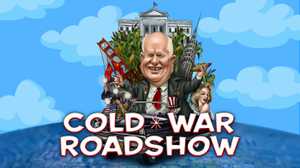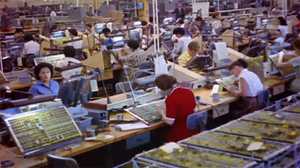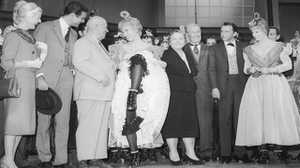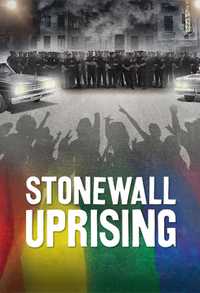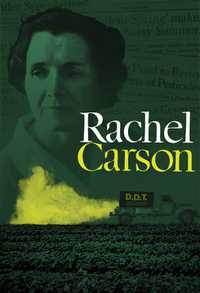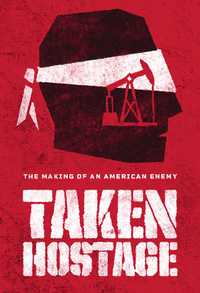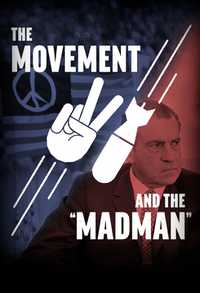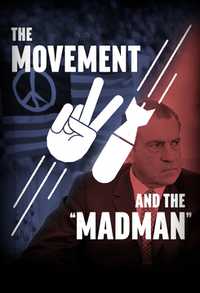Slate: Andrews Air Force Base, Washington, D.C.
William Taubman, Historian: Khrushchev was the first Soviet leader to come to the United States. So, in that sense it was the summit of all summits. I mean, Stalin had never come to the United States. Hitler never came of course. Mao Tse-Tung never came. So, I don't think there's been anything like it in that sense.
Susan Eisenhower, Granddaughter: Back in the 1950s when my grandfather became President of the United States, we had this idea that you didn't have to agree with somebody to meet with them. And this would far riskier than inviting Vladimir Putin to the United States at this particular moment. This was far riskier.
Douglas Edwards, CBS News (archival): We must realize that the goal of Soviet leaders is domination of the world by communism. They intend to use all means, economic, propaganda, perhaps even military, to reach this goal. Total war requires total defense.
William Taubman, Historian: The Cold War took place during a period of international relations in which there were two super powers contesting with each other. Each one had nuclear weapons. Each one could blow up not only the other, but the world altogether.
Susan Eisenhower, Granddaughter: I remember we had civil defense drills. And then at school we had to do so-called duck and cover drills. People were building bomb shelters. I mean, it seems incredible, but people were literally stocking up in case of nuclear attack.
Richard Nixon, Vice President (archival): There are some instances where you may be ahead of us. For example in the development of the thrust of your rockets for the investigation of outer space. There may be some instances, for example, color television, where we're ahead of you. Because after all you don't know everything.
Viktor Sukhodrev (archival): If I don't know everything then I would say that you know absolutely nothing about communism. Nothing except fear of it.
Peter Carlson, Writer: The whole era of the '50s was sort of like a strange combination of "I Love Lucy" and thermonuclear war. Khrushchev was the personification of that.
Dave Garroway, NBC Today (archival): Nikita Khrushchev, a profile we're looking at more closely than ever before, trying to see what it tells us about this man who is now at the height of his power. A short, relatively fat man who hardly fits our image of what the most powerful dictator in the world should be. How did this bulky fellow with the rotund face that might be that of a clown reach his present pinnacle?
Peter Carlson, Writer: Americans didn't know much about him, but he was the face of this strange and scary place. About all they knew was that he had once said, "We will bury you," which sounded very ominous.
William Taubman, Historian: It was a fair thing to focus on Khrushchev. He directed the power of the Soviet Union armed with nuclear weapons. The world was nervous, and Eisenhower was nervous too, and he was desperately trying to figure out, "What does this man want?" He didn't know. And so, he kept coming back to the idea, Eisenhower did, of getting together with Khrushchev face to face.
Newsreel (archival audio): In a special White House conference, President Eisenhower reads the text of a joint announcement released simultaneously in Moscow.
Dwight Eisenhower, President (archival): The President of the United States has invited Mr. Nikita Khrushchev, chairman of the council of ministers of the USSR, to pay an official visit to the United States in September. Mr. Khrushchev will visit Washington for two or three days and will also spend 10 days or so traveling in the United States.
Slate: September 15, 1959
William Taubman, Historian: Nikita Khrushchev wanted to ease, if not end the Cold War. And he had been trying ever since 1955 to wangle an invitation to the United States. Khrushchev wanted to be accepted both as an individual and as the leader of his country, and after years of being denied the invitation he craved to come to the United States he took the invitation when it finally came as a sign that he and his country were now accepted as equals with the United States.
Sergei Khrushchev, Son: And he decided to impress Americans. So, when now he saw that we have this huge plane and it's only one plane the world can fly without stops from Moscow to United States he said that I will use this plane to fly to America. So, my father like all the innovations. He liked to try them. He was impressed of the technology.
Peter Carlson, Writer: Unfortunately, his engineers had found some microscopic cracks in the engine and they advised him not to go on it. But he refused to take their advice, because he did not want to take a plane that would have to stop in England to refuel. So, basically he put himself and his entire entourage at risk of death by getting in this plane.
Sergei Khrushchev, Son: But they have their technicians and these technicians also for precaution they have their headphones and they just listening the sound of the engines. And it was no problem. It is like Christopher Columbus, discovering the America. Americans, we thought, all of them live in the skyscrapers. All of them rich and drive these big cars. And it's all imagination for us.
Slate: Day One, Washington, DC
William Taubman, Historian: When Eisenhower invited Khrushchev, he wanted to figure Khrushchev out as an individual, as a leader, and Eisenhower genuinely did not understand what made this man tick. He also of course wanted to expose Khrushchev to the real virtues of the United States and its capitalist, democratic system.
President Eisenhower (archival): Mr. Chairman, I welcome you, your family and party to the United States. I am especially happy that Mrs. Khrushchev and other members of your family are accompanying you. On behalf of the government and of the people of America I express the hope that you and they will find your stay among us interesting and useful. I am looking forward to the talks we will have together.
David Brinkley, CBS News (archival audio): The President has been given a great deal of advice on what he should do with his visitor. One piece of advice coming from Senator Johnson is that he should take him to church on grounds that it is never too late for a sinner to repent.
Peter Carlson, Writer: Thousands of people came out and watched him drive in, but they didn't know what to do. Am I supposed to cheer? I mean, he's a communist dictator. I'm not going to cheer for him. Am I supposed to boo? No, he'll blow us up if we boo him. So, they just kinda stood there and looked at him.
Sergei Khrushchev, Son: It was hot and we were sleepy. But of course we look on the Americans with same curiosity as Americans look at us.
Reporter (archival): Let me ask you, who do you folks represent?
Man on street (archival): We are from the Committee for National Mourning here in Washington, and we are out on the streets to express national mourning for our country in connection with the visit of Khrushchev to this country. I think it's a tragic event, and we're out to show it.
Peter Carlson, Writer: Well, a few days before Khrushchev arrived the Soviets shot a rocket up into space with a little ball on it and it went to the moon. It landed on the moon. And this was the first time anyone had ever sent an object to the moon. He presented Eisenhower with a facsimile of this ball they'd shot to the moon. There was a hammer and sickle on it. And Khrushchev said, you know, "I'm sure that someday you'll be able to send a rocket to the moon. And when you do our medallion will say hello to your medallion and greet you when you get there."
William Taubman, Historian: This was his way of trying to intimidate, to frighten with the power of the Soviet Union, some of which was exaggerated. He wanted respect.
Peter Carlson, Writer: Eisenhower chose Henry Cabot Lodge to be the tour guide for what turned out to be an 11-day trip. Lodge was our chief diplomat at the UN and he was a tall, handsome WASP from the bluest of blue blood families.
Today Show Announcer (archival): Today it's Wednesday, September the 16th, 1959. Here is Dave Garroway.
Dave Garroway, Anchor, NBC Today (archival): We'll be covering the Khrushchev visit of course this morning as we did yesterday and will all this week. We'll be showing you perhaps facets of it that you may not have recognized, like what a great showman he turned out to be yesterday.
Wynne Miller, NBC News (archival): Yes, I knew when that little girl presented him with the flowers that he was going to embrace her or pat her head or something.
Dave Garroway, NBC Today (archival): Little things like taking the play away from the President by holding his homburg up a couple of feet in the air to shade his face.
Wynne Miller, NBC News (archival): Things that actors kill other actors for.
Charles Van Doren, NBC News (archival): The way-- the way he took out those little 18th century glasses of his, the little round glasses, slowly put 'em on his face. That was brilliant.
Dave Garroway, NBC Today (archival): Putting his arm around the president in the car riding into the airport.
Peter Carlson, Writer: Khrushchev's trip was the first sort of multi-day media event of the TV age. Khrushchev, this Russian peasant, seems to have been among the first people who perceived this. He was very sophisticated about the power of television. He wanted to see the country, and he wanted to put on a big TV show with himself as this dynamic leader of the upcoming communist world. And that's exactly what he got.
Newsreel (archival audio): Nikita Sergeyevich Khrushchev, chairman of the council of ministers and his extensive, lengthy appearance before the National Press Club in Washington, D.C. Mr. Khrushchev in a light tan suit walking out, several other members of the official and personal family of Mr. Khrushchev are at the...
Susan Eisenhower, Granddaughter: He had to be a very good politician or he wouldn't have survived the Stalinist period, nor would he have survived the tussle for power after Stalin's death in March of 1953. Khrushchev had been involved very much in Stalin's circle.
William H. Lawrence, President, National Press Club (archival): There is a story that at the meeting of the Communist Party Congress, during which he delivered his long speech about the crimes that Mr. Stalin had committed, that someone in the audience set up an unsigned but written question. Mr. Khrushchev paused in the middle of the speech and read the question to the audience. "What were you doing while Stalin was committing these crimes?" the question asked. Mr. Khrushchev has suggested that perhaps the author would like to arise and identify himself. No one stood up. "Well, comrades," Mr. Khrushchev said, "Now you know what I was doing while Stalin was committing these crimes." Perhaps the chairman would like to comment on that story.
Viktor Sukhodrev, Translator (archival): The authors of these fables, including the authors of this question, wanted to place me in a difficult position. And there have been laughs even before I replied. But I would say to that they laugh who laugh last. I shall not reply to this question, which I look upon as being provocative and would like to take this occasion to deny any such malicious rumors and lies, which do not correspond to the truth.
William Taubman, Historian: I think that Khrushchev's denunciation of Stalin and the secret speech in 1956 was both the bravest and most reckless thing he ever did. It was the beginning of the end for the Soviet Union, because Stalin had been a god. And he wanted credit for it, at least in the West, in part because he wasn't getting fully the credit he wanted at home. Over time it ate away at the foundations of the Soviet system.
Newsreel (archival audio): And there goes our chairman, Nikita Khrushchev, through the Honor Guard of American Army troops, to the train which will take him to New York City. Again, he's waving to the crowds. And he's done this all through his tour of Washington apparently completely oblivious, or uncaring about the fact that very few people in the crowds here have waved back or done anything but stare at him rather stonily. This does not prevent the chairman from waving heartily and smiling a rather broad, engaging grin, I must confess. So far in his public appearances Khrushchev has shown no indication at all that he's even aware of the elaborate, fantastic security precautions that have been taken for his safety.
Sergei Khrushchev, Son: My father told, "Yes, if they would want to kill me, they will kill me," 'cause he told us, "part of my profession. But if they kill me, of course it will be big problems."
Peter Carlson, Writer: The American authorities were really scared that someone would do something really bad to Khrushchev; shoot him, would be the worst. It's-- J. Edgar Hoover had estimated, God knows how, that 25,000 Americans would have liked to kill Khrushchev. The Soviet bodyguards were also afraid of that, and there was a meeting of State Department officials with the Soviets who were in charge of Khrushchev's security, and the Soviet representative said, "You don't understand, if anything happens to Comrade Khrushchev, boom!"
Slate: Day Three, New York
Peter Carlson, Writer: They were desperate to protect him. And in fact, they overprotected him. They had such a wall of people around him he felt that he was in prison.
William Taubman, Historian: New York was of course above any expression of excessive warmth toward the leader of the anti-capitalist Soviet Union. The individuals who showed up were people who were sincerely offended by some of the things Khrushchev had said. And they were also to some extent trying to appear on television. And some of them were downright rude. All through his life Khrushchev had wanted a certain kind of respect from people of culture and power. And here he was at the heart of it.
Newsreel (archival audio): Nikita Khrushchev at this moment is in the grand ballroom of New York's Waldorf Astoria Hotel. Figuratively it is a most incongruous place for the leader of the world's proletarian revolution to be. He is the guest of honor at a dinner given by the Economic Club of New York. Many of the club's members are bankers and industrialists, businessmen, the targets of much of the criticism of communist dogma. However that may be, it is in the lair of the capitalist that Nikita Khrushchev has gone tonight, ready to continue spraying the air with a perfume from his atomizer of charm.
William Taubman, Historian: There was one occasion at the Economic Club in New York when somebody challenged him and said, "Answer the question. You're not answering the question." Khrushchev was not used to being spoken to in this way in the Soviet Union where everybody bowed down. And when that carried over into resistance to Khrushchev's diplomatic overtures, rejection of his diplomatic proposals, and even the cold welcome that he received at first in the United States, that all intensified his feeling that, "I deserve better and I'm not getting it."
Sergei Khrushchev, Son: One of this events was the speech to the United Nations, and my father, he wanted to speak about disarmament.
Viktor Sukhodrev (archival): I wish to assure the delegates to the General Assembly that in the Soviet Union, the United Nations will continue to have the most active participation in all efforts aimed at releasing mankind from the burden of armaments and consolidating peace throughout the world. The essence of all proposals is that over a period of four years, all states should affect complete disarmament and should no longer have any means of waging war.
Sergei Khrushchev, Son: Of course it was serious proposal if you are talking about negotiation. When he talk about full disarmament, there will be no armies -- of course it was the propaganda of the Soviet policies that we are peaceful. The road to disarmament was long and bumpy, and especially at that time Soviets wanted to build more intercontinental missiles. You have to understand that he wanted to prevent American surprise attack.
Protestor on street (archival): Red murderer!!!
Policeman (archival): Come on.
Protestor on street (archival): Red murderer! Red murderer! Red murderer!
Susan Eisenhower, Granddaughter: Even before Khrushchev arrived, Eisenhower was really alarmed by the extent to which rhetoric in the United States was really almost spinning out of control.
Protestor on street (archival): Red murderer! Red murderer! Red murderer!
Slate: Day Five, Los Angeles
Newsreel (archival audio): There is considerable relief among the people at the Department of State concerned with security that he's gone safely through the New York phase of his visit, since the greatest danger of intelligent, planned opposition to Khrushchev was believed to exist in New York. The road ahead of course may still be lined with individual crackpots.
Peter Carlson, Writer: Khrushchev wanted to go to Los Angeles to see Hollywood. God knows why. Probably because the publicity would be astronomical. Every night each of the three networks had a half hour show wrapping up what had happened that day. Plus during the day many of the events were covered live. When Khrushchev went to a Hollywood lunch, that was covered live in Los Angeles on live TV.
One of the great things about him that made the trip so interesting was that he really was a funny guy.
William Taubman, Historian: What he really was, was a remarkably warm, vital, colorful character. I mean, it took an awful lot of restraint to not be charmed, or at least fascinated, by him as he rolled across the country. And so, it was partly where he was. But I think it's also that he loosened up and became more approachable.
Spyros Skouras, President of Fox Studios (archival): Ah, Mr. Chairman, this I was not going to tell in my speech. But, your country is the greatest corporation, the greatest capitalistic term, the greatest monopoly the world has ever known.
Nikita Khrushchev, in Russian (archival): A very good monopoly.
Viktor Sukhodrev, Translator (archival): A very good monopoly.
Peter Carlson, Writer: Americans love to talk about how in America anyone can grow up in a log cabin and become president of the United States. And in Hollywood Spyros Skouras, the president of Fox movie studio told him, "I came here as a Greek immigrant and I worked as a busboy and I worked my way up and now I'm the president of a movie studio." And Khrushchev started heckling him and saying, "I grew up as a shepherd. And then I worked in a mine owned by the French. And then I worked in a factory. And now I'm the head of the Soviet Union."
Nikita Khrushchev, in Russian (archival): I am the Prime Minister of the Soviet Union!
Peter Carlson, Writer: They sort of had the same critique of each other. The Americans believed that the Soviet Union was ruled by a small clique of communists who controlled the entire country and kept everyone subjugated in slavery. And this-- Khrushchev and the other Soviet leaders believed that America was controlled by a small clique of powerful capitalists who kept everyone else in slavery.
Sergei Khrushchev, Son: And my father told we will not promote communism in your country. But if our system will present better life to the people, your own Americans will elect communist as a president and you will join us.
Mayor Poulson, the mayor of Los Angeles, said that, "I will not recommend you to go to the Disneyland, because it will be unsafe." And my father was very angry.
Viktor Sukhodrev, Translator (archival): When I came here to the city I was given a plan, a program of what I was to be shown and whom I was to meet here. But just now I was told that I couldn't go to Disneyland. I asked, "Why not?" And just listen, just listen to what I was told, to what reason I was told.
Nikita Khrushchev, in Russian (archival): The American authorities are not able to...
Viktor Sukhodrev, Translator (archival): We, which means the American authority, cannot guarantee your security if you go there. What is it? Do you have rocket launching pads there? I don't know. What is it? Is there an epidemic of cholera there or something? Or have gangsters taken hold of the place that can destroy me? And I say I would very much like to go and see Disneyland. For me such a situation is inconceivable. I cannot find words to explain this to my people. I thought I could come here and not have to sit in the sweltering heat in a closed car under your hot sun. I thought I could come here as a free man, as a guest of the free American people. This fact can evoke nothing but profound disappointment on my part.
Sergei Khrushchev, Son: Personally I knew nothing about Disneyland. I knew the Disney movies, Bambi and all others and we like them. But it was not about Disneyland itself; it was about managing my father not in the proper way. And he was very sensitive for this.
TV Interviewer (archival): From an entertainer's point of view what do you think of the show today?
Marilyn Monroe (archival): It's a very interesting afternoon.
TV Interviewer (archival): What did you find most interesting?
Marilyn Monroe (archival): Nearly everything.
TV Interviewer (archival): What did you think of the ad-libs?
Marilyn Monroe (archival): Interesting. Very interesting.
Walter Cronkite, CBS News (archival audio): From one Hollywood spectacular to another. Sound Stage Eight, where the Cole Porter film musical "Can-Can" is in production.
Sergei Khrushchev, Son: My father didn't understand why they decided to show "Can-Can" for him. You are asking yourself why. Why you doing this? But I was different from my father. I was much younger. I was not a political leader, so, I just looking and this it was we ne-- I never saw can-can before. He likes movies. So, of course it was very interesting, like everything.
In the Los Angeles the Mayor Poulson tried to avoid any contact with the people. He just changed the route of the cars that travel around on the empty streets so that Americans don't want to see you. Mayor Poulson was very anti-Soviet, very negative.
Newsreel (archival audio): He got off the plane as we said a number of hours ago, but he still hasn't had a chance to rest. He's been going all day. A Soviet flag on one fender, the American flag on the other fender. There is the chairman wearing his medals, getting a cheer here. And he waves. This is a rather hearty welcome compared to most of them. So, Mr. Khrushchev goes into the Los Angeles Ambassador Hotel.
Newsreel (archival audio): The Russian premier has had his first meeting with the American movie industry. Tonight he meets the business leaders of the City of Los Angeles at a dinner hosted by Mayor Norris Poulson.
Norris Poulson, Los Angeles Mayor (archival): Mr. Chairman, we do not agree with your widely quoted phrase, "We shall bury you." You shall not bury us. We're happy with our way of life. We recognize its shortcomings and are always trying to improve it. But if challenged we shall fight to the death to preserve it.
William Taubman, Historian: Well, Khrushchev was easily provoked, and at one point before his trip to the United States he said, "We will bury you." He always insisted that he was referring to his oft-proclaimed determination to prevail in peaceful coexistence, that is, that was his favorite term. "We coexist peacefully, we compete and we win." And when he came to the United States at virtually every public occasion at which he spoke people dredged up this quote and hit him over the head with it. And he got madder and madder.
Viktor Sukhodrev, Translator (archival): I can put this text in my pocket now. I turn to you Mr. Mayor and my dear host. You have shown wonderful hospitality towards me and to my comrades. And I thank you. And I want to say the truth. Can I do that here? In your speech you said that we wanted to bury you. I want to ask you, why did you mention that fact? Already while I was here in the United States I've already had occasion to give clarification on that point. I trust that even mayors read the press. At least in our country the chairman of the city councils read the press. If they don't they risk not being elected next time. I am talking seriously, because I have come here with serious intentions. And you try to reduce the matter to a joke. It is a question of war or peace between our countries. The question of the life or death of the people.
Peter Carlson, Writer: He claimed that the mayor of Los Angeles had insulted him and that he was perfectly capable of flying back to the Soviet Union immediately, canceling the rest of the trip and no Soviet official would ever return. And by the way, we're turning out missiles like sausages. So, the people in the hall got scared.
Sergei Khrushchev, Son: So he threatening them, Americans, when he talked that we produced missiles like sausages. He exaggerated our strengths. And I work at that time missile industry. I told, "How can dad tell this? We have only two missiles. What sausages?" And he laughed at me and he told, "It's not important how many missiles we have. Americans have to believe that we have enough of them."
Peter Carlson, Writer: Khrushchev was a much more complicated man than he seemed to be. He was full of bluster and seeming over-confidence, but there was a level of insecurity that was rooted in the fact that he had almost no education and even less culture. He went to school for no more than two or three years. And so, some of his edginess on the American trip, some of his tendency to explode when insulted or when he thought he was insulted, came from the fact that all of this was touching this sore point that he had about his own shortcomings.
Howard K. Smith, CBS News (archival): Washington, where or near where the climax of Khrushchev's trip will be played in a few days, has watched the Soviet leader's tour pass the halfway mark with mixed feelings. There is, as the White House statement said today, a profound wish that Khrushchev will be treated courteously on his tour. It would be a shame if relations between the giant nuclear nations which survived the Berlin blockade and the Korean War should now founder on a missed excursion to the Disneyland amusement park. Washington wants nothing to happen which would cast a shadow on the talks Khrushchev is to have with President Eisenhower here late this week.
Slate: Day Seven, Northern California
Peter Carlson, Writer: He genuinely was angered by his treatment in LA. So, after LA, as they went up the coast by train to San Francisco, he managed to convince Henry Cabot Lodge to stop walling him off with security and let him mingle with Americans more. He liked common people. He had come up from common people and he liked them. And that came through.
Sergei Khrushchev, Son: He lost his medal. It was golden medal. And somebody pick it up. He could put it in his pocket, because it is a good souvenir, but he decided to return it. My father, he see how honest are Americans. It is good people.
Viktor Sukhodrev, Translator (archival): How old are you?
Peter Carlson, Writer: He told Lodge at one point, "You see the Americans love me. It's only those bastards around Eisenhower that don't like me." He was this guy who was now the biggest star on TV. There were approximately 340 reporters accredited to the trip. So, that doesn't count cameramen and non-reporters who came along as technicians. There were so many reporters that Khrushchev was surrounded by them. Sometimes he wished they'd get out of the way so he could see what he was supposed to see. But he was glad they were there.
William Taubman, Historian: They all say this was perhaps the best, most exciting story they ever covered, because it combined high tension of the Cold War with the incredible warmth of this man. And there he is, you know, he wants to be loved.
Sergei Khrushchev, Son: When American government they try to find out who want to host Khrushchev, it was the president of IBM company, Tom Watson, who told, "Yes, I want to show him my achievement. I will hosted him." And he was touring him around this factory, showing the production of the computers. So, my father look around this and he look-- thought, he told, "Yes, we also have computers, maybe even better than yours." For him most interesting was not the production of the computers, but the cafeteria, because it was self-service, and we didn't have this invention in the Soviet Union. Here you see the this very clean plastic tables. And you yourself bringing tray in there. So, he told, "Oh, I like it." And he returned to Moscow and gave order, "Do the same as Americans doing where you have to copy that and do self-service in our cafeteria in our plants."
Slate: Day Eight, Iowa
Charles Kuralt, CBS News (archival): What do you folks think about Nikita Khrushchev's coming to Des Moines? Are you in favor of it?
Female Iowa Resident (archival): Well, I think it's a wonderful thing for him to see how ordinary people live, and how we live in America.
Charles Kuralt, CBS News (archival): If you did see him would you wave?
Male Iowa Citizen (archival): Oh yeah. I'd wave at him. I'd wave anyway even if I didn't like him, you know. It would be a poor wave, you know.
Charles Kuralt, CBS News (archival): A poor wave?
Male Iowa Citizen (archival): Yeah.
Charles Kuralt, CBS News (archival): Thank you very much. So that's the way the people feel along the drug counter of Katz Drug Store.
Walter Cronkite, CBS News (archival): Well, tomorrow Mr. Khrushchev goes to the Garst farm, the real object of his visit to Iowa. He had said all along he hoped to visit his old friend Roswell Garst. Our live television cameras will be on the scene tomorrow night at 8 o’clock will return with a complete report of Khrushchev on the farm.
Peter Carlson, Writer: Roswell Garst might have been the only man in the world who could steal a scene from Nikita Khrushchev. Garst was a big potbellied Iowa farmer and developer of hybrid corn. Garst had gone to the Soviet Union and given lectures about corn. Garst and Khrushchev were both corn freaks. They both believed that they could feed the world with corn. And Khrushchev ended up buying some huge amount of Garst's hybrid seed corn. When Eisenhower invited him here the first thing Khrushchev said is, "I want to go to Garst's farm." And Garst was eager to have him.
So, when he went he was surrounded by TV cameras and reporters who had gotten there a little bit before he did and wired everything for sound. There were TV cameras everywhere. And Garst for some reason didn't expect this. He expected Khrushchev would show up with a few reporters and a translator and Henry Cabot Lodge and he could actually show them how hybrid seed corn farming worked.
And there were all these cockamamie reporters trampling his corn, walking all around Khrushchev. And so, Garst got really irate. And at one point he pulled a stalk of corn out of the ground and started charging the photographers. "Get back. Get back."
Sergei Khrushchev, Son: My father was very interested. He like to visit innovators. No difference it was innovators in the computers, innovators in the missile industry, especially in agriculture. So he told, "I want to see how this man working on his field." And he was very impressed. He was not only impressed by the Garst seeds. He knew them. But he was impressed of the technology. But his colleagues from the leadership they told that, "You are meeting with all these capitalist, but you don't want to meet with the leaders of the communist party of the West?"
And my father answered, "Because these businessmen will tell me something new." He looks in the America like our adversary, but same time he understood and he said that Americas is very successful country and much more successful than Russia. And we have to learn from Americans.
And so, the people became more and more familiar with him. They very friendly crowds. And they want to touch Khrushchev. And he was agree with this. He told you want to touch me. Please, touch me." You can't show him as a devil if he was smiling person just shaking hands like any others.
Man in crowd (archival): okay?
Man in crowd (archival): Okay?
Man in crowd (archival): Okay. Yeah.
Walter Cronkite, CBS News (archival audio): Mr. Khrushchev had his first frankfurter--
Camera Man (archival): Take a big bite. Show him taking a big bite.
Walter Cronkite, CBS News (archival audio): --in the sausage making department of the packing plant. He proclaimed it good. He said that Soviet maybe ahead in moon rockets, but we seem to be ahead in sausage making.
Sergei Khrushchev, Son: So, here he was smiling and told, "You want to use me to promote your products? It's a good product? I'd be happy to promote it."
Peter Carlson, Writer: I don't think he turned anybody in America into a communist, but he certainly won people over to the idea that this guy is not some kind of monster. He certainly won people over if not to the idea that communism is better, at least to the idea that this guy is a recognizable human type. He's one of us.
Slate: Day Twelve, Camp David
Susan Eisenhower, Granddaughter: When Khrushchev got back from his whirlwind trip around the United States Eisenhower and Khrushchev ended up at Camp David.
William Taubman, Historian: It is quite true that in 1959 the world faced the possibility of a nuclear holocaust. And so, this trip was an effort by the two great powers and the two great men, Eisenhower and Khrushchev, to get beyond the threats, to get beyond the images of universal death and come to some kind of understanding. Khrushchev and Eisenhower formed a bond at Camp David and even earlier during the trip. Eisenhower agreed both to a summit in Paris the next spring and a reciprocal visit to Russia the next summer. And Khrushchev had been angling for that summit for four or five years. For Khrushchev that was going to be almost as big as his trip to the United States. But if you look coldly at the diplomatic business on the table before them they actually accomplished almost nothing.
Susan Eisenhower, Granddaughter: They went for a walk in the woods together with only a translator and they discussed many issues that found no resolution at all. And then at one point Eisenhower is reputed to have taken a power nap and when he got up he had an idea. He decided to call up my mother and say, "Get the kids cleaned up and over to the house in a half an hour. I'm bringing Khrushchev to the farm." This was the inner sanctum then. It wasn't just a presidential retreat. He was going to take Khrushchev to his personal home. So, that was when I met the Soviet Premier.
From Ike's perspective he was sending, I think, a pretty strong signal, which is that we really have to find some way out of this, because these are my grandchildren and their future is at stake. After that meeting was over and we went out to the front door and we were saying our goodbyes, Nikita Khrushchev put his hand in his pocket and produced four little red stars, which he pinned on my little dress and my siblings' clothing. And, of course, for Americans who don't know what the red star was, this was a symbol of the Soviet Union.
Walter Cronkite, CBS News (archival audio): Well, gentlemen now that it's all over on balance was this visit a good idea? Howard K. Smith.
Howard K. Smith, CBS News (archival): Well, I think that the people of this nation and the world were so tired of a stagnant Cold War that it lasted 14 years and so insisted on some new approach that this visit, which was a new approach, was good.
Walter Cronkite, CBS News (archival): Blair, you've been with this Khrushchev road show from the very beginning. Do you think he sold this bill of goods to us of peace and friendship? Well, what is the reaction of the American people?
Blair Clark, CBS News (archival): I think people in this country, generally, started out fascinated with the whole idea of this character from this other planet barnstorming this country. But, I think that a great many Americans after this Khrushchev visit are readier now than they were before for the an era of good feeling with the Soviet Union.
William Taubman, Historian: When he returned from the United States he trumpeted his success in his American trip and the fact that Eisenhower was gonna come to the Soviet Union. And immediately they began preparing for it. They cleaned the facades of the buildings that Eisenhower would pass by. They built new hotels for Eisenhower to stay at. They built a golf course in Siberia. Of course in the end Eisenhower didn't come.
Slate: Seven months later
Peter Carlson, Writer: A week before the summit and a month before Ike was scheduled to go to Russia, we sent a U-2 spy plane over Russia. We'd sent U-2s before and the Soviets were unable to shoot them down. But on May 1st, 1960 the U-2 came over, the Russians did shoot it down,the Americans came up with a cockamamie cover story that this was a weather plane, and then Khrushchev revealed, "We've got the pilot. We've got his pictures. He was spying on us."
William Taubman, Historian: Even after the plane was shot down and even as he gloated over having done so, he tried to protect Eisenhower by assuming publicly that Eisenhower was not responsible. But Khrushchev taunted Eisenhower into admitting that he had authorized the flight. And once Eisenhower admitted that he had authorized the flight Khrushchev had to cancel the reciprocal visit which allowed these great forces and misunderstandings to resume their hold over both leaders and their people.
Peter Carlson, Writer: So, Khrushchev goes to the summit. He ruins the summit. He cancels Eisenhower's trip. And then he decides to travel to the United States again to the UN General Assembly in the fall of 1960. And he traveled to New York, this time without an invitation. The Americans said, "You can't leave Manhattan. You can only stay there." [He]made many, many speeches, all of them belligerent, and then finally did the gesture that most people remember, the only thing most people remember about Khrushchev. He took off his shoe and banged it on the desk. The only problem is there's no picture of it.
But here you've got a guy who is a dictator of the power that has nuclear weapons, and yet here he is at the UN taking his shoe off like a two-year-old and banging it on the table in this horrendous temper tantrum. And you just get the impression, oh my God, if he can do that he's perfectly capable of blowing us all up.
William Taubman, Historian: Khrushchev talked with gallows humor about nuclear war endlessly. But I think that the sheer specter of the destruction that could follow nuclear strikes and counter strikes held him back. And one has to believe that one of the things that deterred him was the knowledge of the country which could suffer the impact of his missiles if he ever pressed the button. The palpable reality of the Americans whose hands he had shaken and whose beer bellies he'd poked had to have increased his sense that however tense that situation was there were lines that must not be crossed. It took 30 more years to end the Cold War, and of course, for the Soviet system to disappear. But this was the start of it.
Sergei Khrushchev, Son: I filmed everything from the window for the car, because I was part of the team, and so I have these home movies about a trip to America. I will say it was like discovering new land. Everything was interested: how people dressed, how they different from us or similar to us. And theirs cars and and advertising, people, building, food, everything. I can say that America looks for me like a great country in 1959. And I think that I have the same impression now when I am became American citizen. It's a great country.
